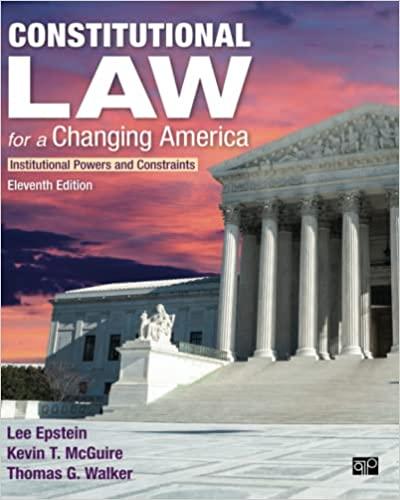Question
Professor Coan is pulled over by an Arizona state trooper while driving 82 miles per hour on a section of Interstate Highway 10 with a
Professor Coan is pulled over by an Arizona state trooper while driving 82 miles per hour on a section of Interstate Highway 10 with a posted speed limit of 75 miles per hour. Despite Coan's protestations that he was only seven miles over the limit, Officer Williams writes him a speeding ticket carrying a fine of $375. Frustrated, Coan contests the ticket in traffic court. Arizona law provides that a person driving less than 10 miles over the posted speed limit is subject to a fine of not more than $400. What is the principal issue for the traffic court to decide? What is the rule governing that issue? Does application of that rule yield a clear and decisive conclusion? If not, what are the best arguments on each side? What conclusion is a court likely to reach? Is this an easy or a hard case?
A week later, Professor Coan is pulled over again while driving 72 miles per hour on a section of Interstate Highway 10 with a posted speed limit of 75 miles per hour. Despite Coan's protestations that he was driving three miles under the limit, Officer O'Grady writes him a second speeding ticket carrying a fine of $375. In disbelief, Coan schedules another traffic-court hearing to contest this ticket. Under Arizona law, speeding is the act of driving in excess of the posted speed limit. What is the principal issue for the traffic court to decide? What is the rule governing that issue? Does application of that rule yield a clear and decisive conclusion? If not, what are the best arguments on each side? What conclusion is a court likely to reach? Is this an easy or a hard case?
The Humanitarian Law Project (HLP) trains nongovernmental organizations in conflict zones on strategies for avoiding violent conflict. The training it provides consists purely of verbal and written instructionin other words, speechon the quintessentially political topic of conflict resolution. In the past, the organizations HLP has trained include the Kurdistan Workers' Party of Turkey and the Tamil Tigers of Sri Lanka, both of which have been designated "foreignterrorist organizations" by the U.S. government. Under the USA PATRIOT ACT, passed in the aftermath of the 9/11 attacks, it is a federal crime to "provide ... assistance" to such organizations, evenwhen such assistance takes the form of speech with the purpose of facilitating peace negotiations. The idea is that providing any assistance to these organizations could lend them legitimacy or free up resources for their violent activities. After the Act was passed, HLP filed suit challenging this provision as a violation of its First Amendment right to freedom of speech. The First Amendment prohibits Congress frompunishing or otherwise restricting political speech, except when doing so is necessary to advance a compelling government interest. What is the principal issue raised by Humanitarian Law Project's lawsuit? What is the rule governing that issue? Does application of that rule yield a clear and decisive conclusion? If not, what are the best arguments on each side? What conclusion is a court likely to reach? Is this an easy or a hard case?
Step by Step Solution
There are 3 Steps involved in it
Step: 1

Get Instant Access to Expert-Tailored Solutions
See step-by-step solutions with expert insights and AI powered tools for academic success
Step: 2

Step: 3

Ace Your Homework with AI
Get the answers you need in no time with our AI-driven, step-by-step assistance
Get Started


